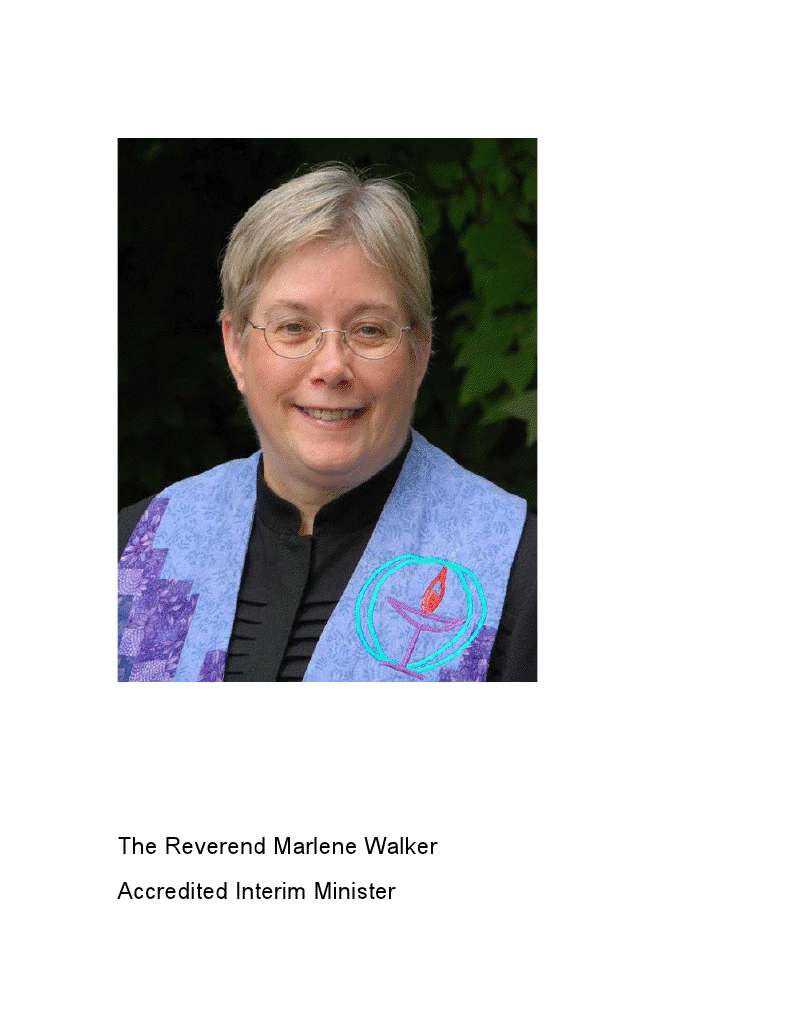The Reverend Marlene Walker
Accredited Interim Minister
 Hello JRUUC,
Hello JRUUC,
I am delighted to be entering into the exciting work of interim ministry with you. The interim time between two ministries is a dynamic and rich time of transition. Intentional
interim ministry is a relationship that I enter into with a congregation, promising to be present; to pastor and listen, to reflect, lead, coach and guide. It is an awesome thing to be in
such a relationship, one that I honor, and hold with great respect and care.
Fundamental to my understanding of ministry is that it is a shared enterprise. Ministry is not something I do, but rather a relationship that I enter into with a congregation
and it’s people. The many dimensions of ministry; preaching, teaching, facilitating, counseling, are all based on my understanding of ministry as a mutual relationship with individuals, with a congregation and with how we each speak of what is holy, divine and central in our lives. My primary task-my calling-is to be a pastor; walking with, being present
with, the members of a congregation as they deepen their relationships with each other, and with their understanding of what is ultimate, holy and nourishing in their lives.
This is also central to my understanding of interim, transitional ministry, as well. I find the work of interim ministry, being with a congregation as it moves through a transition between settled ministries, dynamic, challenging and exciting. Every congregation that finds itself in transition is different and has different needs. There is no one size fits all answer. Yet, there are many tools to use as I steadfastly coach, guide, facilitate and pastor to a congregation in transition. The five developmental tasks of interim ministry are the framework of interim ministry. At the same time I believe that the solid everyday work of ministry in general; primarily the pastoral care of a congregation and its worship life, is even more necessary to a congregation in transition. So even in the midst of the ongoing transition work my style of interim ministry remains pastoral and collaborative.
It takes a lot of listening; listening to what a congregation, corporately and individually, is saying to be an effective interim minister with a congregation in transition and its members. Hearing what its needs are, what its hopes are, and what its fears are. It is, after all, the congregation that is the enduring center of our UU understanding of ministry.
This does not mean that I do not see myself as a leader, or that I am reluctant to make difficult decisions, but rather that I make decisions only after such listening and sharing have taken place. This is what mutual, shared, collaborative ministry means.
As a minister, I share my own religious and spiritual journey, not because it is more important or valid than anyone else's, but because it is part of the conversation, part of building relationships. My religious journey has been varied and eclectic, and is by no means over. My personal theology is UU christian; flavored by the jewish heritage of my family
background, earth based traditions, and study and exploration of many other world religious traditions. I am as comfortable in a pagan circle as I am at a Christian communion service or in a Native American ceremony as I am at Friday Shabbat service in a synagogue. I am truly multilingual theologically. For me, this is one of the beauties of being Unitarian Universalist. What is important is that we engage in exploring our individual religious and spiritual journeys, bringing them into the conversation. This is the beauty of the richness that can occur in the diversity of a UU congregation.
— Marlene Walker

